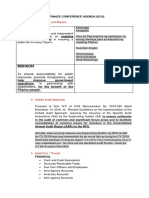0 ratings0% found this document useful (0 votes)
1K viewsCoa Res 2018-010
Coa Res 2018-010
Uploaded by
Ray Vincent ChanRevised Code of Conduct and Ethical Standards for Commission on Audit (COA) Officials and Employees
Copyright:
© All Rights Reserved
Available Formats
Download as PDF or read online from Scribd
Coa Res 2018-010
Coa Res 2018-010
Uploaded by
Ray Vincent Chan0 ratings0% found this document useful (0 votes)
1K views5 pagesRevised Code of Conduct and Ethical Standards for Commission on Audit (COA) Officials and Employees
Original Title
COA RES 2018-010
Copyright
© © All Rights Reserved
Available Formats
PDF or read online from Scribd
Share this document
Did you find this document useful?
Is this content inappropriate?
Revised Code of Conduct and Ethical Standards for Commission on Audit (COA) Officials and Employees
Copyright:
© All Rights Reserved
Available Formats
Download as PDF or read online from Scribd
Download as pdf
0 ratings0% found this document useful (0 votes)
1K views5 pagesCoa Res 2018-010
Coa Res 2018-010
Uploaded by
Ray Vincent ChanRevised Code of Conduct and Ethical Standards for Commission on Audit (COA) Officials and Employees
Copyright:
© All Rights Reserved
Available Formats
Download as PDF or read online from Scribd
Download as pdf
You are on page 1of 5
Republic of the Philippines
COMMISSION ON AUDIT
‘Commonwealth Avenue, Quezon City, Philippines
RESOLUTION No 2019-010
Date FEB O1 2018
SUBJECT: Revised Code of Conduct and Ethical Standards for Commission
on Audit (COA) Officials and Employees
WHEREAS, under Commission on Audit (COA) Resolution No. 86-50 dated
October 1, 1986, the Code of Ethics covering government auditors was ordained and
adopted;
WHEREAS, Republic Act (RA) No. 6713, the Code of Conduct and Ethical
Standards for Public Officials and Employees, was enacted and became effective on March
25, 1989 and adopted on April 21, 1989;
WHEREAS, Intemational Standards of Supreme Audit Institutions (ISSA 30 -
Code of Ethics issued by the International Organization of Supreme Audit Institutions
(INTOSAI) requires that each SAI shall ensure that all its auditors are acquainted with the
values and principles enshrined in the national Code of Ethies and shall act accordingly;
WHEREAS, ISSAI 30 has been institutionalized in COA with the adoption of the
Code of Ethics for SAIs through COA Resolution No. 2013-007 dated 29 January 2013;
WHEREAS, all COA officials and employees are expected to perform end
discharge their duties with the highest degree of competence, excellence, independence,
and professionalism;
WHEREAS, the Commission aims to attain its mission and vision and maintain
high morale and standards among its officials and employees;
WHEREAS, the conduct of COA officials and employees should be beyond
reproach at ail times and in all circumstances. Any deficiency in their professional conduct
or personal lives might affect their integrity as COA officials and employees and the
quality and validity of their work;
NOW THEREFORE, this Commiston RESOLVES, as it does hereby
RESOLVE, to prescribe the Revised Code of Conduct and Ethical Standards for COA
Officials and Employees, as follows:
f 7
CODE OF CONDUCT AND ETHICAL STANDARDS FOR COA OFFICIALS AND
EMPLOYEES
Pursuant to RA No. 6713, otherwise known as the Code of Conduct and Ethical
Standards for Public Officials and Employees, which took effect on March 25, 1989, and
the Civil Service Commission Rules and Regulations Implementing the Code of Conduct
and Ethical Standards for Public Officials and Employees, the Commission hereby resolves
to adopt the herein Code of Conduct and Ethical Standards for the guidance and observance
of all officials and employees in the discharge of the mandated functions of the
Commission under the Constitution and the laws of the Republic of the Philippines.
PREAMBLE
Public office as a public trust commands the highest degree of morality and
integrity by which the holder thereof is bound to do right. Morality is the very essence of
public ethies, the foundation of public office.
COA officials and employees must be accountable to the people at all times. They
shall discharge their duties with utmost responsibility, indepeadence, integrity, competence
and loyalty, act with patriotism and justice, lead modest lives, and uphold public interest
over personal interest.
RULET
Norms of Conduct of COA Officials and Employees
COA officials and employees shall perform and discharge their duties with the
highest degree of integrity, competence, excellence, independence, professionalism,
objectivity, respect, and courtesy. The following norms prescribed under RA No. 6713
shall strictly be observed by public servants and COA officials and employees:
Section 1. _ Commitment to Public Interest — They shall always uphold public
interest over and above their personal interest. They shall ensure that all government
resources in their respective offices are used honestly, efficiently, economically, and
effectively to avoid wastage of public funds.
Section 2, Professionalism — They shall perform and discharge their duties
with the highest degree of excellence and shall exercise due professional care. They shall
enter public service with utmost devotion and dedication to duty and endeavor to comply
with applicable laws, rules and regulations, and avoid any conduct that may discredit the
Commission. ;
Section 3. _Integrity - They Wf maintain the highest degree of integrity in
their personal and official actions and must be guided by a strict sense of honesty and
uprightness
Section 4. Independence ~ They shall endeavor to preserve and protect their
independence. To that end, they shall avoid or eschew any relationship or circumstance
which would likely, even subconsciously, impair their objectivity and independent
Be
judgment. They shall avoid situations or actions that would tend to weaken their
impartiality and objectivity.
Section 5. _Justness and Sincerity — They shall (@) be fair and sincere in all
their dealings with their clientele, fellow workers, and the general public; (b) act with
impartiality without any discrimination; (¢) respect the rights of others; (d) refrain from
doing acts contrary to law, public morals, good customs, public policy, public order, public
safety, and public interest; and (¢) avoid giving/extending undue favors to their relatives,
whether by consanguinity or affinity, on account of their positions, except with respect to
appointments of such relatives to positions considered strietly confidential or as members
of their personal staff whose terms are co-terminous and perform their work with dispatch
and consistency.
Section 6. Competence — They shall endeavor to acquire and maintain
knowledge and skills appropriate for their roles, and to act in accordance with applicable
standards, and with due care.
Seetion 7. Political Neutrality and Partisan Polities — They shall provide
equal services to everyone regardless of party and cultural affiliation, preferences, and
beliefs, and shall not engage, directly or indirectly, in partisan political activities or take
part in any election except to vote, nor shall they use their official authority to coerce or
influence the political activity of any person or body.
Section 8. Confidentiality and Transparency — They shall protect
information, balancing with the need for transparency and accountability.
Section 9, Responsiveness to the Public — In order to sustain public
confidence, they shall conduct themselves in a manner that is above suspicion and
reproach, They shall also extend prompt, courteous, and adequate service to the public,
Unless otherwise provided by law or when required by the public interest, they shall
provide information on their policies and procedures in clear and understandable language,
ensure openness of information, simplify and systematize policy, rule and procedures,
avoid red tape and develop an understanding and appreciation of the socio-economic
conditions prevailing in the country, especially in the depressed rural and urban areas,
Seetion 10. Nationalism and Patriotism — They shall, at all times, be loyal to
the Republic of the Philippines and to the Filipino people, support and defend its
Constitution, obey its laws, legal orders and policies, and to faithfully discharge their dutics
and responsibilities to the best of their abilities. They shall also promote and encourage the
use of locaily-produced goods, resources, and. oe
Seetion 11. Commitment to DemMacy — They shall commit themselves to a
democratic way of life and values, maintain the principle of public accountability, and
manifest adherence to civilian authority. They shall uphold the Constitution at all times,
putting love of country over and above loyalty to persons or party.
Section 12, Simple Living — They and their families shail lead a modest way of
living appropriate to their positions and income. They shall not indulge in extravagant or
ostentatious display of wealth in any form. Basically, modest and simple living means
maintaining a standard of living within the public official and employee’s visible means of
7
You might also like
- The Subtle Art of Not Giving a F*ck: A Counterintuitive Approach to Living a Good LifeFrom EverandThe Subtle Art of Not Giving a F*ck: A Counterintuitive Approach to Living a Good LifeRating: 4 out of 5 stars4/5 (5979)
- The Gifts of Imperfection: Let Go of Who You Think You're Supposed to Be and Embrace Who You AreFrom EverandThe Gifts of Imperfection: Let Go of Who You Think You're Supposed to Be and Embrace Who You AreRating: 4 out of 5 stars4/5 (1112)
- Never Split the Difference: Negotiating As If Your Life Depended On ItFrom EverandNever Split the Difference: Negotiating As If Your Life Depended On ItRating: 4.5 out of 5 stars4.5/5 (898)
- Hidden Figures: The American Dream and the Untold Story of the Black Women Mathematicians Who Helped Win the Space RaceFrom EverandHidden Figures: The American Dream and the Untold Story of the Black Women Mathematicians Who Helped Win the Space RaceRating: 4 out of 5 stars4/5 (932)
- Grit: The Power of Passion and PerseveranceFrom EverandGrit: The Power of Passion and PerseveranceRating: 4 out of 5 stars4/5 (619)
- Shoe Dog: A Memoir by the Creator of NikeFrom EverandShoe Dog: A Memoir by the Creator of NikeRating: 4.5 out of 5 stars4.5/5 (546)
- The Hard Thing About Hard Things: Building a Business When There Are No Easy AnswersFrom EverandThe Hard Thing About Hard Things: Building a Business When There Are No Easy AnswersRating: 4.5 out of 5 stars4.5/5 (356)
- Her Body and Other Parties: StoriesFrom EverandHer Body and Other Parties: StoriesRating: 4 out of 5 stars4/5 (831)
- Elon Musk: Tesla, SpaceX, and the Quest for a Fantastic FutureFrom EverandElon Musk: Tesla, SpaceX, and the Quest for a Fantastic FutureRating: 4.5 out of 5 stars4.5/5 (476)
- The Emperor of All Maladies: A Biography of CancerFrom EverandThe Emperor of All Maladies: A Biography of CancerRating: 4.5 out of 5 stars4.5/5 (275)
- The Little Book of Hygge: Danish Secrets to Happy LivingFrom EverandThe Little Book of Hygge: Danish Secrets to Happy LivingRating: 3.5 out of 5 stars3.5/5 (424)
- The World Is Flat 3.0: A Brief History of the Twenty-first CenturyFrom EverandThe World Is Flat 3.0: A Brief History of the Twenty-first CenturyRating: 3.5 out of 5 stars3.5/5 (2272)
- The Yellow House: A Memoir (2019 National Book Award Winner)From EverandThe Yellow House: A Memoir (2019 National Book Award Winner)Rating: 4 out of 5 stars4/5 (99)
- Devil in the Grove: Thurgood Marshall, the Groveland Boys, and the Dawn of a New AmericaFrom EverandDevil in the Grove: Thurgood Marshall, the Groveland Boys, and the Dawn of a New AmericaRating: 4.5 out of 5 stars4.5/5 (270)
- The Sympathizer: A Novel (Pulitzer Prize for Fiction)From EverandThe Sympathizer: A Novel (Pulitzer Prize for Fiction)Rating: 4.5 out of 5 stars4.5/5 (125)
- Team of Rivals: The Political Genius of Abraham LincolnFrom EverandTeam of Rivals: The Political Genius of Abraham LincolnRating: 4.5 out of 5 stars4.5/5 (235)
- A Heartbreaking Work Of Staggering Genius: A Memoir Based on a True StoryFrom EverandA Heartbreaking Work Of Staggering Genius: A Memoir Based on a True StoryRating: 3.5 out of 5 stars3.5/5 (232)
- ENTRANCE CONFERENCE AGENDA DiscussionDocument6 pagesENTRANCE CONFERENCE AGENDA DiscussionRay Vincent ChanNo ratings yet
- On Fire: The (Burning) Case for a Green New DealFrom EverandOn Fire: The (Burning) Case for a Green New DealRating: 4 out of 5 stars4/5 (75)
- The Unwinding: An Inner History of the New AmericaFrom EverandThe Unwinding: An Inner History of the New AmericaRating: 4 out of 5 stars4/5 (45)
- Criminal Law 1 Aaa Vs BBB: Supreme CourtDocument4 pagesCriminal Law 1 Aaa Vs BBB: Supreme CourtRay Vincent ChanNo ratings yet
- Faypon Vs QuirinoDocument3 pagesFaypon Vs QuirinoRay Vincent ChanNo ratings yet
- GOITIA vs. CAMPOS RUEDADocument3 pagesGOITIA vs. CAMPOS RUEDARay Vincent ChanNo ratings yet
- A11 LegRes Aff LegitDocument2 pagesA11 LegRes Aff LegitRay Vincent ChanNo ratings yet
- Strict ConstructionDocument28 pagesStrict ConstructionRay Vincent ChanNo ratings yet
- Exec Soliven V MakasiarDocument4 pagesExec Soliven V MakasiarRay Vincent ChanNo ratings yet
- Letter Request For ExtensionDocument1 pageLetter Request For ExtensionRay Vincent ChanNo ratings yet
- Manual EntriesDocument1 pageManual EntriesRay Vincent ChanNo ratings yet
- Exit Survey PDFDocument2 pagesExit Survey PDFRay Vincent ChanNo ratings yet
- Philippines's Constitution of 1987Document67 pagesPhilippines's Constitution of 1987Ray Vincent ChanNo ratings yet



















































